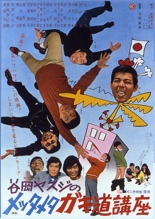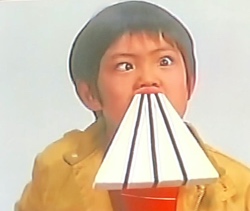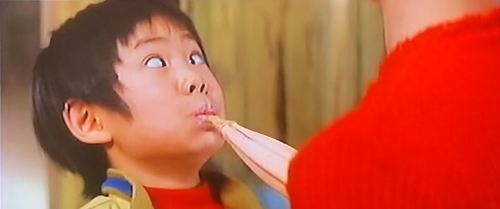
 They just don’t make ’em like they used to. No, really, they just don’t make ’em like they used to — probably because they wouldn’t be allowed.
They just don’t make ’em like they used to. No, really, they just don’t make ’em like they used to — probably because they wouldn’t be allowed.
Case in point: Metta Meta Gakido Koza, alternately translated as The Rascal’s Messy Messy Road or Go as Messy as Messy Can Be. Whichever title comes affixed, the Japanese comedy is based on a popular manga by the prolific Yasuji Tanioka. It’s about Gakio Oryama, a pubescent boy taunted for his small penis and obsessed with sucking women’s breasts — against their will, if that’s what it takes. He’s a perverted Dennis the Menace who’s traded overalls for short pants.
Metta Meta is less a story than a collection of scenes in Gakio’s crazy, mixed-up, tits-a-poppin’ life. His mother (Rika Fujie, Outlaw: Black Dagger), gorgeous but sexually deprived, makes do with an inflatable doll with detachable johnson. His dad (Shinsuke Minami, Zatoichi and the One-Armed Swordsman) is henpecked to infidelity and ineffectuality. His bonneted baby sister (Attack Ichiro) has quite the mouth on her (example: “You stupid bitch.”). His grandmother (Toyoko Takechi, Dragon Princess) seems pretty cool, though, having a Charles Bronson poster on her bedroom wall.
Despondent over his tiny unit, Gakio tries — and fails — to commit suicide by drowning, by hanging and by being run over by a train. At school, Gakio asks his teacher (Bullet Train’s Keiko Aikawa), rhetorically, “Have you completely lost your fear, cow?” before instigating a classroom furniture fight.
At the neighborhood bar, Gakio drinks his dad under the table. Impressed, a barfly tells the boy he’s free to do whatever he wants to her, so right then and there, he scoops a boob out of her dress and goes to town on it, accidentally deflating it. No longer impressed, the barfly and her posse beat Gakio to a pulp. Dad joins the fun by running him over with a steamroller, prompting Gakio to scream, “You are a dumb pork head!” When Dad and the barflies try to bury him a barrel of cement, Gakio slices off the ladies’ dresses: “Being a little devil is great!”
The drinking continues at home, where Gakio orders Mom to bring him beer after beer. He even gets the smart kid across the street to imbibe, turning the classmate into a full-blown alcoholic. Back at school, after a lesson on pollination, Gakio and his fellow students pin the teacher to the ground and presumably gang-rape her. Outside the school, he sexually assaults the crossing guard, then asks her out. The boys in his class pick up street hookers and take them to the public showers.
 Paying a visit to Dad’s salaryman office, Gakio lifts the skirts of every woman in sight. Before long, the boss (Toshiaki Minami, 1970’s The Assassin) has his lady employees in a topless lineup; Gakio goes home with the boss’ busty secretary (singer Tomomi Sawa) after trying to unbutton her blouse on-site. In Metta Meta‘s climax, Gakio faces and fights the yakuza. Then he goes home and tells his mother, “Mom, I really love your tits!” To prove it, he yanks one out and latches on; in response, her eyes cross to suggest she’s kinda into it — at least until he deflates it, too, and pulls it back with his teeth like a piece of taffy. On the roof, the man in the bug suit cheers.
Paying a visit to Dad’s salaryman office, Gakio lifts the skirts of every woman in sight. Before long, the boss (Toshiaki Minami, 1970’s The Assassin) has his lady employees in a topless lineup; Gakio goes home with the boss’ busty secretary (singer Tomomi Sawa) after trying to unbutton her blouse on-site. In Metta Meta‘s climax, Gakio faces and fights the yakuza. Then he goes home and tells his mother, “Mom, I really love your tits!” To prove it, he yanks one out and latches on; in response, her eyes cross to suggest she’s kinda into it — at least until he deflates it, too, and pulls it back with his teeth like a piece of taffy. On the roof, the man in the bug suit cheers.
Oh, did I forget to mention that earlier? Sorry. There’s a man in a bug suit on the roof, played by Jō Shishido (Seijun Suzuki’s Branded to Kill). As far as I can tell, he serves as the film’s ersatz rooster, announcing when it’s morning and afternoon and the like. That he is the least weird element of Metta Meta Gakido Koza should tell you something, except it tells you everything. This is, after all, a nonstop buffet of sexual assault, slapstick violence, cartoon physics, exaggerated popeyed faces, sped-up motion and — in the film’s lone sign of restraint — only one baby hurled down a bowling lane.
Director Mio Ezaki (1970’s Dangerous Games) shows no blood when characters take an ax to the head, instead saving all that red stuff to gush out Gakio’s nose when he’s sexually excited — an anime trope started by Tanioka. More often, Gakio’s erections are suggested by his front teeth growing into giant piano keys — a sight gag uncomfortably bringing to mind the buck-toothed Asian stereotype. Whether that was intended is a mystery to me, but an accurate translation of bringing the crude images (in more ways than one) of the source material to colorful life. Even with all its questionable material, the movie somehow pulls off an all-in-fun innocence I’m willing to buy, likely because it’s five decades old. A marked difference exists between “I can’t believe what I’m seeing and I’m offended!” and “I can’t believe what I’m seeing!” Because I’ve never seen anything quite like it, Metta Meta Gakido Koza belongs to the latter. —Rod Lott

